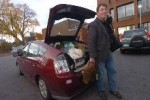Profs go the distance

One hundred and seventeen miles is quite a long distance. Now multiply that by two and you get two hundred and thirty four. To some that’s the distance traveled for a family vacation. But for professor Scott Roper, that’s just his daily commute. “I commute from Lyndeborough, a small town near Peterborough, N.H. My drive is about 117 miles, which comes out to about 2-1/2 hours,” he said.
Business professor Tom Rutkowski also spends a lot of time in a car.
“Glenmont, N.Y. is south of Albany 7 miles. Eighty -seven miles here,” he said. “That’s the shortest way I know. That’s country roads, that’s up and down by farms, that’s over by the slate quarries, that’s out there.”
But why don’t these professor’s move closer to work?
“We have a really nice house in a nice neighborhood and my wife’s happy, and her job is near there, and one of us has to drive so it’s me,” Rutkowski said, with a smile.
Professor David Blow, who commutes from Queensbury, N.Y. four days a week says, “I guess I stay in Queensbury because A) My wife won’t move and B) seriously I love the area there. There’s a small ski mountain 10 minutes away, Lake George, Saratoga, Albany and the Adirondacks near by.”
For Roper, he’s not moving because he lives in the middle of the two places he and his wife work.
“My wife Stephanie is a history professor at a college in southern New Hampshire, and I don’t want to make her commute any worse than it already is,” he said.
Marketing professor Thomas Spangenberg now resides close by in Hubbardton, but he is very familiar with a commute in a past life.
“I commuted to and from New York City for 25 years. Commuting to Castleton is a no brainer. There’s no traffic, no stop lights, and I can stop to get a muffin,” he said.
But driving to campus on a weekly basis, as tedious as it may sometimes be, does have some benefits, professors say.
“It’s a beautiful ride and I get to see a lot of nature,” Blow states with an excited look.
“I’d have to say the scenery is the best part of the drive. I go through some nice parts of New Hampshire and Vermont,” Roper said.
But the abundant nature on the drive can be a detriment too.
“That’s also one of the worst parts. I will stop for any squirrel, chipmunk, turtles and everything else that I can,” Rutkowski said.
He’s not alone.
“The first time I saw a turkey I stopped the car!” said English professor Elizabeth Ashworth. “The first time I thought, oh those crows are big and then you get up on it and you’re like, oh it’s a Turkey! I’m from California, you’re not going to see that stuff in the city,” she adds.
Wildlife and scenery aside, sitting in a car for a few hours at a time can really take a toll on your body physically, some professors said.
“It takes a toll on my back, knees, and ankles,” stated Rutkowski.
“I find that sitting in one position for 2-1/2 hours isn’t as easy as it was in my 20’s and 30’s, and I get a little sore,” Roper adds.
The drive can also be mentally draining, they said.
Winters in Vermont can be hazardous to say the least. Between snow, ice, rain and wind, what is normally a smooth sailing commute, can turn into one heck of a nail bitter.
“It’s the ice that makes me crazy, but then I just make my husband drive me,” Ashworth says with a smile.
“When I first started making the commute there were a couple of days when I had to leave home very early and took me four hours to get in. But luckily for me, Vermont tends to over-salt its roads” Roper exclaims.
Although travelling in the snow can be treacherous, faculty and staff still find the courage to make it to campus.
“I haven’t missed a day because of ice or snow, but it really does scare me!” stated Tina Betit of the registrar’s office, who drives from Granville, N.Y. every day.
Heather Morrisson, also from the registrar’s office, who makes the journey from Fort Ann, N.Y., said “winter is the worst part about commuting. People think that New York does a better job clearing roads, but that’s not true.”
So why do these workers put up with these commutes?
“Bottom line. You find a job you love and you won’t be tired, you won’t be sick, and you’ll bound out of bed in the morning,” Rutkowski says in a mellow yet serious tone.




